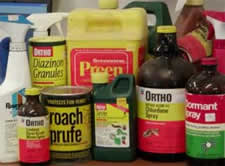Water Testing for Pesticides in Connecticut
 Testing your CT water for Pesticides because they contain contaminants called carcinogens, and it is assumed that no concentration in Connecticut drinking water is safe.
Testing your CT water for Pesticides because they contain contaminants called carcinogens, and it is assumed that no concentration in Connecticut drinking water is safe.
However, the EPA must decide what level of risk is acceptable for regulation. Scientists usually focus on the relationship between concentration in drinking water and the risk of causing a cancer cases in a specified number of people.
Pesticides are one category of synthetic organic chemicals, which are manufactured by humans from carbon, hydrogen, nitrogen, chlorine, and other elements for a variety of purposes.
Pesticides can enter CT drinking water as a result of accidental spills, illegal dumping, industrial discharge during manufacturing, improper field applications, or excessive rainfalls. The health effects of pesticides depend on their chemical characteristics.
Before the 1940s, most pesticides contained heavy metals such as arsenic, mercury, copper, or lead. These pesticides were not readily soluble and rarely leached into CT groundwater. A group of chlorinated organic pesticides were introduced during World War II that were considered to be safer because of their low solubility and tendency to attach to soil particles.
These pesticides included DDT, chlordane, heptachlor, heptachlor epoxide, and toxaphene. When it was discovered that these pesticides accumulated in the environment and reached toxic concentrations, most of their uses were restricted, suspended, or canceled. However, some chlorinated organic pesticides may still pose a general cancer risk because of their persistence in the environment and their ability to concentrate in the fat tissues of fish and wildlife.
A new group of organic pesticides, phosphorus-based compounds such as malathion and diazinon, replaced the low solubility chlorinated pesticides. Although these are highly toxic to humans in their original chemical form, these pesticides generally break down rapidly in the environment and rarely leach to Connecticut groundwater.
Another group of organic pesticides,carbamates such as aldicarb and carbofuran, also replaced the chlorinated pesticides. These non-carcinogenic pesticides tend to be soluble in water and may reach groundwater in CT if not degraded in the soil.
You should be concerned if:
- Someone in your household is pregnant or nursing.
- An unexplained illnesses has occurred in the family.
- A dangerous contaminant was found in your neighbor’s well.
- The water’s taste, odor, color, or clarity changes.
- You have a spill of chemicals or fuel into or near your well.
To have your Connecticut well water tested for pesticides call us today 888-558-1574.









